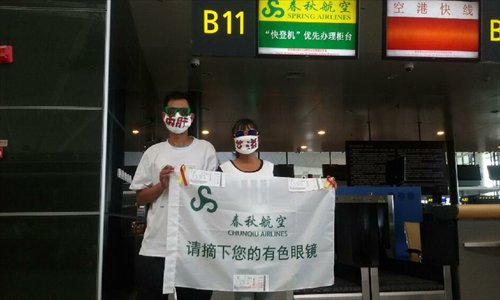 The 4th Chinese National Pole Dance Championship held in Tianjin
The 4th Chinese National Pole Dance Championship held in Tianjin
 Chinese navy commandos debut at 2014 RIMPAC
Chinese navy commandos debut at 2014 RIMPAC
 Guangxi impression: scenic countryside
Guangxi impression: scenic countryside
 World's largest aquatic insect found in Sichuan
World's largest aquatic insect found in Sichuan
 Ceremony volunteers for Youth Olympics make public appearance
Ceremony volunteers for Youth Olympics make public appearance
 A glimpse of female crew of Liaoning aircraft carrier
A glimpse of female crew of Liaoning aircraft carrier
 Stills from "Dad, where are we going?"
Stills from "Dad, where are we going?"
 Legless man's happy life
Legless man's happy life
 Top ten most beautiful islands in China
Top ten most beautiful islands in China
 Aerial view of Hong Kong
Aerial view of Hong Kong
 |
| Two HIV-positive passengers protest against discrimination by Spring Airlines in Shenyang, Liaoning Province on July 28. (Photo:Courtesy of Cheng Shuaishuai) |
Cheng Shuaishuai was outraged when he and his fellow passengers were denied the right to board a plane in Shenyang, capital of Northeast China's Liaoning Province. There were no air traffic control issues, nor was the plane delayed because of bad weather. In fact, the flight took off on time, leaving Cheng and his two friends at the airport, because of what some of them carried with them—not drugs, but the HIV/AIDS virus.
The three had booked their July 28 Spring Airlines flight from Shenyang to Shijiazhuang well in advance, but weren't told about the cancellation of their tickets until they got in line to board the plane.
"When I first told them there were HIV patients among us, the employees began to look panicked. Then I told them I am not a HIV carrier myself, but they insisted that they have the right to refuse passengers without a doctor certificate," Cheng said, adding that they eventually left Shenyang on a train "without any restrictions" the next day.
As a Henan-based volunteer promoting HIV carriers' rights, Cheng told the Global Times that he is prepared to file suit against Spring Airlines for discriminatory service.
This is expected to be the first case brought against an airline for discriminating against an HIV-positive patient in China, where discrimination against those with HIV still prevails, in spite of the nation's efforts to allay public concerns.
"On the one hand, it is hard for people to change their opinion on HIV/AIDS if they haven't talked to HIV carriers in person," Cheng told the Global Times. "But more importantly, rules such as those of Spring Airlines [that enable discrimination] have to stop adding fuel to the fire."
Strict health regulations
Cheng posted his story online, along with a letter addressed to Wang Zhenghua, head of Spring Airlines, and photos of his friends protesting at the airport in Shenyang. Wearing masks and sunglasses, the two stood in front of a Spring Airlines service counter, holding up a banner that read "please stop judging people through tinted spectacles."
The rejection immediately drew a great deal of attention online, especially among HIV campaigners, who saw it as blatant discrimination, owing to the widely acknowledged fact that HIV is not an airborne disease.
At the same time, another picture also went viral on Sina Weibo. Against the background of a Spring Airlines flight, the picture read that the company has become "the fourth way to spread HIV" besides blood, sexual, and maternal-neonatal transmission.
However, Spring Airlines insisted on telling its side of the story. On July 29, an anonymous employee with the company said that the rejection was meant to protect the health of all passengers. "If an HIV carrier is suffering from decreased immune function, he/she might experience a higher rate of flight-triggered complications" said the employee.
Two days later, Mao Yi, the company's media officer further explained that the company rejected all three passengers, including Cheng, as it did not have the expertise to distinguish HIV carriers from normal people, and it "wouldn't risk people's lives," reported the Shenyang-based Liaoshen Evening News.
"We cannot guarantee that we have never flown any HIV patients in the past. But there are many ways a passenger could hide his/her medical record. We are just carrying out the letter of the regulations. A full refund could be offered if possible," Mao told the newspaper, adding that the company also required a doctor's certificate as proof of health for passengers older than 70.
Current regulations for passengers on domestic flights grant airlines the right to refuse passengers with infectious or psychological diseases. Those whose condition might jeopardize themselves or other passengers can also be denied the right to board, according to the Civil Aviation Administration of China (CAAC).
However, there are no specific rules on infectious diseases. "Each airline can design its own rules accordingly," a CAAC employee surnamed Shi was quoted as saying by the Liaoshen Evening News.
Say yes to HIV carriers
Nine other major airlines in China, including Air China and China Eastern Airlines, have reported that they do not bar HIV patients from their flights, although some make boarding contingent on proof of "stable condition."
Zhang Wu'an, a spokesperson for Spring Airlines, told China National Radio on Sunday that the airline has removed any clauses in its regulations that might enable discrimination. "We have never discriminated against any HIV carriers. Actually, we care for and understand this special group of people," Zhang said.
Zhang added that the original regulation included HIV/AIDS under the clause about infectious diseases, as it is listed as one in national regulations. "We removed the clause that addressed infectious diseases, since we have no ability to diagnose diseases ourselves," Zhang said. "In special situations like with the Ebola virus, airlines carry out notices issued by the government and WHO."
The company also published a statement on August 1 that emphasized its respect for and understanding of HIV carriers. But the statement, in Cheng's eyes, was disappointing and ambiguous.
"The statement wrote that HIV carriers should take 'necessary protective measures' on the plane to prevent infection of others. This is what angers us the most. By putting up this requirement, it is still sending a signal to every passenger that the disease is transmissible on the plane," said Cheng.
Liu Wei, a senior human rights lawyer for HIV carriers, told the Global Times that the company's refusal to allow HIV carriers to board a plane is blatant discrimination and an obvious violation of relevant regulations.
"Nondiscrimination is not only a must to promote HIV prevention and treatment, but also a crucial part of a civilized society," said Liu. "Chinese people need to be equipped with more knowledge, especially those who make policy or design regulations. Combating HIV/AIDS requires public support and attention as well as advanced technology."
As a result of their effort, Cheng and many campaigners participate that the company will behave differently in the future. And indeed, Fu Le, a HIV carrier from Sichuan Province, and another HIV patient were able to successfully board a flight from Sichuan to Yunnan Province on Spring Airlines on Tuesday evening.
 Sophomore sells fruit through WeChat in Shandong
Sophomore sells fruit through WeChat in Shandong Blockbuster? No, it’s firefighters’ posters
Blockbuster? No, it’s firefighters’ posters
 Special 'gifts' for IT men for Chinese Qixi Festival
Special 'gifts' for IT men for Chinese Qixi Festival
 Foreign students' colorful life in China
Foreign students' colorful life in China
 French photographer‘s work 'China 2050' goes viral online
French photographer‘s work 'China 2050' goes viral online Dressed in uniforms to marry you
Dressed in uniforms to marry you
 Female soldier in Chinese special force
Female soldier in Chinese special force
 Zhujiang ambassadors attend lotus lanterns activity
Zhujiang ambassadors attend lotus lanterns activity
 From girly girl to tough special police officer
From girly girl to tough special police officer
 22-year-old veteran travels around China
22-year-old veteran travels around China
 Night scenery of pagoda forests
Night scenery of pagoda forests China suffers from hot summer
China suffers from hot summer 48 hours after super Typhoon Rammasun
48 hours after super Typhoon Rammasun German pianist plays mid-air ‘magic carpet’ show over Munich Airport
German pianist plays mid-air ‘magic carpet’ show over Munich Airport
 China's manned deep-sea submersible conducts dive in Pacific Ocean
China's manned deep-sea submersible conducts dive in Pacific Ocean
Day|Week|Month